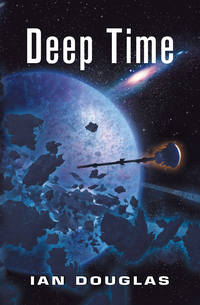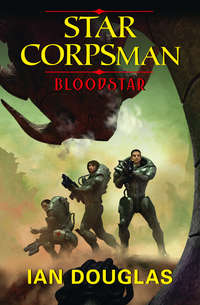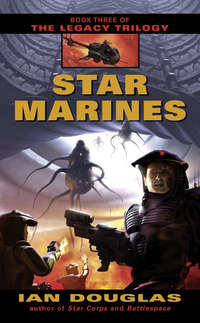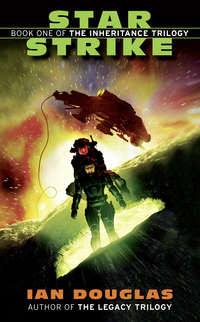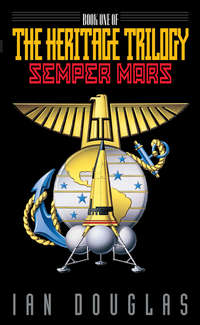
Полная версия
The Complete Heritage Trilogy: Semper Mars, Luna Marine, Europa Strike
She remembered her mother reading to her a lot when she was little. Her dad had told her that a lot of the books her mother read to her were stories about spaceships and other planets and alien beings, books she later devoured for herself. Books by Heinlein and Asimov, Longyear and Brin, Zettel and Ecklar. It was infuriating. Here her dad was going off on a trip she’d give her eyeteeth for, not to mention certain other less mentionable parts, and he didn’t care! He’d rather be on a beach in the Bahamas than on the sands of Mars! She was gonna have to comm that man a lecture. If he didn’t learn to enjoy walking where no human had walked before…well, she wasn’t sure what she’d do to him, but it wouldn’t be pleasant, she could assure him of that.
She tapped on the vid icon on her PAD. It swelled and morphed into a waist-up view of a Marine major, with the stark gray wall of his hab behind him.
“The top o’ the morning to you, Chicako,” he said with a grin, “or whatever time it is when you see this.” She grinned in return. The pet name her dad had given her when she was six and in love with everything Japanese meant “near and dear,” and only he and Yukio were allowed to use it. “Well, it’s been another exciting day in the old Poly, dodging asteroids and space pirates again. To keep from dying of boredom, I’ve actually resorted to some of those science-fiction books you gave me. The problem is, of course, that the realistic ones are boring and the unrealistic ones keep reminding me of how boring the real planet is likely to be. Take this one I’ve been reading lately, for instance.” He held his PAD up in front of him. “Red Planet by that buddy of yours, Robert Heinlein.”
Buddy of mine! Come on, Dad. He’s been dead for fifty years.
“What I’m thinking is, if there were any aliens down there where we’re going, like there are in that book, well, then this trip just might be worth something. But you know, Chicako, I just can’t see that investigating rocks is worth the investment of thirty Marines. I can’t help but feel that we’re being used somehow.” He shook his head and chuckled. “What am I talking about; of course, we’re being used. We’re supposed to be used. I guess what I mean is that we’re not being used properly. We’re not being used as a tool, we’re being used as a pawn in some vast political game that I don’t understand. But I can tell you, I don’t like it.”
He looked away for a long moment. “Something else I don’t like,” he said finally, turning back to face her. “This…uneasy dance we’re doing with the UN. I know we have to let them use our cyclers by treaty, but why we’re letting them horn in on our explorations on Mars is beyond me. Do they really think we’d hog all the goodies? I don’t know.”
“There’s something that happened today I want to tell you about. It…it disturbed me, and I’m not entirely sure why. Maybe you can help me make some sense out of it. So long, Chicako. When next you see me, I’ll be on the beach.” His mouth twisted in a wry grin. “No ocean, unfortunately, but it’ll be nice to have ground underfoot again. Till then.” His face stayed on the screen for a full second and then dissolved into a string of numbers—the rest of his message was in code.
They’d started writing in code right after her mother died. A big, grown-up seven-year-old girl didn’t really want to put down in writing that she was scared, that she missed her mommy, that she wished her daddy could be home with her instead of being stationed overseas. So her dad had taught her a simple substitution code so she could say all those things without anyone else knowing what she was saying.
Over the years their codes became more and more sophisticated, until now they were using a Beale code, guaranteed unbreakable without the book the code is based on. And that was the beauty of it. It could be any book; it was simply necessary that the two parties agree on the book and, specifically, on the edition of that book. For the Mars trip, the Garroways had agreed on a 2038 reprinting of Shogun, a twentieth-century novel about sixteenth-century Japan. Kaitlin had downloaded both the book and her own Beale code translation program to her dad’s wrist-top before he’d left for Vandenberg.
Since then he’d used the Beale code routine for a part of just about every letter he’d sent her, but in the seven months that he’d been gone on the Polyakov, he’d only used it once or twice for more than a one- or two-liner. She paged down and estimated that, decoded, the message would probably run four or five paragraphs.
Kaitlin selected the text and ran her Beale code routine, wishing she could talk to him. V-mail was great, but there were still limitations. On the other hand, if he were here in person, he probably wouldn’t talk about what was bothering him. He was a very private person. Maybe writing about whatever it was that had happened was the only way he could let it out.
As she began to read the translated text, she found herself growing cold. “Consorting with the enemy,” he called it. Just because the woman was working for the UN? What is this? It’s not as though we’re at war or anything. She wondered what her father would think of her relationship with Yukio and was suddenly very glad she hadn’t told him about her proposed trip to Japan.
A shadow fell over her PAD, and she looked up, startled. The backlit figure looming above her raised his hands in mock horror. “I didn’t do it! Honest! Whatever it was, it wasn’t me!”
She quickly tapped on the screen, hiding the message in the background. “Oh, it’s just Dad,” she said, as Yukio coiled down beside her.
“Ah.”
Kaitlin folded up her PAD and tucked it back into its case. “And just what does ‘ah’ mean?” she asked.
He smiled. “It means that occasionally experiencing a lack of harmony with one’s paternal ancestor appears not to be an exclusively Japanese trait.”
“Ah.”
“Exactly.” He began twining his fingers through her hair. “Have I mentioned lately that I love you, Chicako?”
She grinned. “Not since we got out of bed this morning, Snow Boy,” she replied, using a rough translation of his name. She put her arms around his neck to greet him properly. “You’re good for me, did you know that?”
“Mmm,” he murmured as he responded warmly to her kiss. “You’ve said something about that a time or two before, I believe.”
After a long moment, she pulled back. “You know, I’m kind of glad I stopped by the Japanese Room that day.”
He nodded. “Me too. But we would have met eventually. It was fated.”
Kaitlin looked quizzically at him. “Do you believe that? Do you really believe everything will work out for us?”
He turned very serious eyes toward her. “Those are two distinct questions, Kaitlin. Ones that do not necessarily have the same answer.”
There was no response to make to that, so she made none. She knew what he meant; there was no point in going over it again. Instead she opened her belt pouch and pulled out the two quick-pak lunches she’d picked up earlier at the campus store.
“The landing is only a few days away now, isn’t it?” Yukio asked as he produced two cold-bottles out of a hip pouch. He thumbed them open and handed one to her.
Kaitlin took a sip and then another. “Mmm, kiwi, that’s good.” She pressed a button on her wrist-top to check the calendar. “Yes. Three days. They should rendezvous with the landers Saturday morning.”
“It is not a Japanese sentiment, but I…I envy them.” He tore off the lunch pack’s lid and started to eat it.
Her mouth quirked in a wry grin. “It’s funny, isn’t it. Here the two of us are, dying to go into space. And there’s my dad on his way to Mars, and he doesn’t even want to be there! He keeps complaining about being bored!” She picked a processed seabar out of her lunch and started chewing on it.
“Is that what was…bothering you?”
She swallowed and took a deep breath. Might as well talk about it. “No. It was politics again. Damn, I hate politics!”
Yukio shrugged. “Politics is nothing more than two people trying to decide if they can share a bowl of rice, or if one of them will use his sword to ensure that all the rice is his. It is as much a part of being human as breathing.”
“Well, then maybe being human ain’t all it’s cracked up to be. Why can’t people just work together without all this stupid squabbling? Why can’t we take care of each other instead of fighting over who gets the scraps?”
“It is not in our heritage to be kind to others when we haven’t enough for ourselves. Altruism is not a survival trait, Kaitling.”
She grinned at his deliberate mispronunciation of her name. Yukio was proud of his English, justifiably so, and this past year had delighted in adding English puns to his repertoire.
“Well, I’m not entirely sure what the bowl of rice is, in this case, but the guys with swords seem to be two of the archeologists. Actually, the problem seems to be that they’re not using their swords but Dad thinks they should. I don’t know. I think this metaphor is getting bent all out of shape.” She finished up the seabar and started in on the edible packaging.
“There are lots more where that one came from.”
She laughed. “Maybe I should just try to tell the story straight. Dad feels strongly that Americans should not be…intimate with UN personnel. In fact, he went so far as to call it ‘consorting with the enemy.’ Can you believe that?”
Yukio was silent for so long that she wondered if he’d heard her. “Yukio?”
He started. “I am sorry. I think my father would find your father’s sentiment…not difficult to understand. There is considerable tension now concerning the possibilities of what may be discovered on Mars. I believe…I fear that it could lead to war.”
“But that’s absurd! Whatever we find there, it’s gonna take years to figure out even what it is, much less how we can use it! Why would we go to war over something like that?”
“Because people aren’t always sensible, my love. Because a perceived advantage can be as strong a reason to fight as a real advantage.”
“What would Japan do? What does your father say?”
“If the UN and the US were at war?” Yukio shook his head. “It is hard to say. We have treaty obligations to the United Nations, it is true…but my country is always loyal to itself first. I believe we will try to stay out of the fighting, if we can. I do not know what my father believes.”
“Well, maybe we can ask him in person next week.”
Yukio made no reply. Kaitlin let the silence drag on for a while, looking closely at him. Something was bugging him, but she knew better than to try to get anything out of him before he was ready to talk. He was a lot like her father in that respect. But she could sometimes get away with badgering her father when he was trying to keep things from her. If she did that with Yukio, he would just clam up even more.
“Kaitlin,” he said finally. “I need to talk to you about our…proposed trip.”
Proposed? She’d thought it was settled. She clamped down on the questions she wanted to ask, giving Yukio the space to say things in his own way.
“I have received orders from the Space Defense Force. I must report to Tanegashima in twelve days.”
She was stunned. She’d known, of course, that Yukio was technically in the military—he was here in the US, after all, to study the advanced electronics he needed as a space-aviation specialist—but he was supposed to be on a two-year study leave, or whatever they called it. They weren’t supposed to suddenly call him back, not now when—
She stopped herself. You’re a grown woman, Kaitlin, she told herself. Start acting like one.
“What’s the reason for the sudden recall?” she asked in what she was delighted to hear was a calm voice. “Did they give any explanation?”
“My orders say merely that I am assigned to Tanegashima Space Base for a possible upgrade in my flight status. They don’t even say how long I am expected to be there. But I received a vidmessage from my father. Because of his position with the government he frequently has access to information that is withheld from ordinary mortals. The impression I receive from his words is that this is a temporary assignment only, that I will be permitted to return here next fall to continue my studies. He implies that we are simply putting on a good face for our allies.”
“Did you know that something like this might happen? I mean, I thought the deal was that you would complete your studies before going back into the service.”
Yukio had finished his lunch, box and all. He picked up a small stone and began carving into the dirt at the base of the tree. “You say, ‘going back into the service.’ But, Kaitlin, I have never left. I am a chu-i in the Space Defense Force—you would say a ‘lieutenant’—and I have always been under orders. I must follow those orders and fulfill my duty.”
“Funny,” she said, brandishing a dessert roll at him. “I always thought of you as chocolate creme, not chu-i.”
Either he did not catch her pun, or he ignored it. He took a deep breath and looked straight at her. “We will have to cancel our trip, or at least postpone it. Perhaps you can come out later, when I know—”
“Why?”
Yukio looked startled, and then his face went cold and expressionless, and Kaitlin bit her lip. He seemed so Westernized, so…American, most of the time that she often forgot that he was still obedient to shikata, the way of doing things that is so distinctly Japanese. Interrupting a speaker when the two are equals was more than rude, it was disruptive of the wa, or harmony, that all Nihonjin strive for.
“Sumimasen, Toshiyuki-san.” She bowed her head, instinctively turning to Nihongo for her apology. The two of them spoke a mixture of English and Japanese with each other, but some things just didn’t come out right in English. “O-jama shimashita.”
“Daijobu, Chicako.” He reached out and stroked her cheek. “I try to be open to Western ways, but sometimes I still just…react. After living here for a year I see much that is good in your openness, in your willingness to try new things, to change, but I find sometimes that I am still tied to the old ways. And the old ways must change if we are to take advantage of all the future has to offer.”
“But there is good in the old ways, Yukio.”
He nodded. “Yes. We must find a way to continue the growth of the past one hundred years without losing that which makes us what we are. It is…difficult.
“When we planned this trip, it was with the understanding that we would be traveling together, that I would introduce you to my family, yes, but also that I would show you around the country. This I can no longer do. I will probably be free from duty most evenings, but Tanegashima is six hundred kilometers from Kyoto. Even traveling by hydrofoil and maglev, it would be impossible for me to come home for anything less than a weekend.”
“But couldn’t I meet you there?” Kaitlin countered. She polished off the last of her package and washed it down with a slug of kiwi drink. “You’re right, it’s a long way from Kyoto, but your home’s not the only possibility. If I couldn’t actually go to the base, maybe I could meet you at Kagoshima or Miyazaki. There are probably youth hostels there, same as there are in Kyoto.”
“But still I would be working, and I do not even know if I will have evenings or weekends off.”
“When do you have to report? What day?”
“A week from Monday.”
“Well, then we’d still have three days together, I’d get to meet your parents, your family, and after that…You seem to have forgotten that I have my own reasons for wanting to go to Japan.”
Yukio picked up his stone again and continued his scraping. “You truly wouldn’t object to being on your own in my country?”
She raised one eyebrow. “Is my Nihongo that bad?”
He grinned and tossed the stone at her. “You speak it fluently, and you know it.”
“Precisely. So we leave next Thursday as planned. Right?”
“One final question. These are…dangerous times. Do you really think it will be safe for you to travel to a country allied with the UN?”
“The idea of war over Mars is ridiculous, Yukio. Mexico, I’ll grant you, is a problem, with the Aztlan question and everything, but even if that flares up, I can’t see Geneva putting Japanese troops on American soil to deal with it. Look, I know our countries are technically on different sides, but Japan has resisted the UN-sanctioned embargoes. We’re still trade partners. I just can’t see that there would be a problem. It’s not as though we’re talking about going to Colombia or France!”
Yukio shook his head. “I did not want to prevent you from going to Japan, but I wanted to make sure that you knew what the situation was.”
Kaitlin grinned. “Yukio, my love, you couldn’t have kept me from going to Japan if you’d tried, and that’s not my Western individualism talking. That’s money talking. Maybe rich kids like you can contemplate with equanimity losing a couple thousand bucks on a canceled SCRAMjet fare, but I can’t. I’ve been saving up for a trip to Japan ever since I was old enough to rake leaves, and I’m gonna be on that Star Raker next Thursday, whether you’re there or not.”
FOUR
FRIDAY, 11 MAY
United States Embassy
Mexico City, República de
México
1453 hours local time
Sergeant Gary Bledsoe, USMC, stood at his sandbag-encircled post on the portico outside the Embassy Residence, watching uneasily as the crowds gathered in the plaza beyond the front gate. Many carried signs, some in Spanish, most—displayed for the reporters and vidcams—in English. YANQUIS HANDS OFF MARS! one read. ALIEN TREASURES ARE FOR ALL! read another. Some of the demonstrators evidently were voicing their support for Aztlan, an Hispanic homeland to be carved out of Mexico’s northernmost states—and the US Southwest. Tensions with Mexico had been at the boiling point since 2038, ever since the UN declared a plebiscite to be held in August of this year; the United States had already announced that it was not signatory to the agreement that had called for a vote on independence within its own territorial boundaries.
Occasionally, a rock or bit of garbage sailed over the high stone wall that fenced off the embassy compound. Someone, Bledsoe could hear, was haranguing the crowd in Spanish over a shrill and feedback-prone PA. He couldn’t tell what was being said, but the crowd evidently approved, judging from the full-throated roar that followed each emphatic statement.
“Man, what’s bitin’ them?” Corporal Frank Larabee, standing at Bledsoe’s side, said nervously.
“What’s the matter? Don’t you download the netnews?” Bledsoe said, his tone bantering. “They’re afraid we’re out to loot the Ancients’ ruins on Mars and get all the good stuff for ourselves.”
“Yeah? So what’s that got to do with us?”
“The Ugly American, guy. Haven’t you heard? We’re getting uglier every day.”
“Ugly?” Larabee patted his M-29 assault rifle. “I’ll show ’em ugly.”
“Easy there, Bee,” Gary said. “I haven’t heard a weapons-free, yet. You just be damn certain your toy’s clean.”
Both Marines were wearing their Class-Threes, low-tech, camouflaged helmets and kinevlar torso armor. Normally, of course, they’d have been in their Class-As, the full-dress blues with red-and-white trim that had been the uniform of Marines on embassy guard duty for well over a century now, but as the Mexican crisis had exploded into this ongoing riot, the orders had come down to go to battle dress.
The orders had also allowed them to carry loaded weapons, though they still had to wait for a release order to lock and load or open fire, even if they were fired on first. For a while there, a couple of weeks ago, the embassy Marines had been going around with unloaded rifles. The joke going the rounds at the time had been that the boxy, plastic M-29s weren’t properly shaped to serve as decent clubs, so if a Marine was attacked, his best bet was to give his rifle to his attacker, then kick the bastard in the kneecap while he was still trying to figure out how the adtech weapon worked.
The M-29 ATAR, or advanced-technology assault rifle, was a direct-line descendent of the German-made G-11s of the last century, firing a 4.5mm ablative sabot caseless round with a muzzle velocity of over a kilometer and a half per second. With each bullet embedded in a solid, rectangular block of propellant, there was no spent brass with each shot, and no open ejection port to foul with dirt, sand, or mud. The weapon was loaded by snapping a plastic box containing one hundred rounds into the loading port in the butt, a “bullpup” design that resulted in a rifle only seventy centimeters long and weighing just four kilos. The ’29 looked like a blocky, squared-off plastic toy with a cheap telescope affixed to the top and a pistol grip on the bottom…which was why the men and women who carried them referred to the weapons as their toys.
The caseless ammo was both the M-29’s greatest strength and its biggest weakness. The lack of shell casings to feed through an ejection port gave the rifle an incredibly high cyclic rate of twenty-five hundred rounds per minute, so fast that a three- or five-round burst could have the bullets on their way and dead on-target before the recoil had affected the shooter’s aim. On the downside, though, the firing chamber was easily fouled by chemical residues from the propellant blocks. The weapon used a clean-burning propellant, but there was always some gunk left over when it burned, and without an ejection port or shell casings, that gunk built up fast…fast enough to degrade the rifle’s performance after only a couple of mags.
The Corps, which lived by the rule that the rifle was the whole reason there was a Marine in the first place, met this weakness with typical directness. Every Marine took a perfectionist’s care of his weapon, learning to field-strip and clean it under the most extreme and dangerous of conditions, to do it fast, and to do it right. “Aw, he’s got shit up his chamber” was by now well-established Marine slang for someone who didn’t know what was what, who hadn’t gotten the word, or who didn’t know what the hell he was doing.
“She’s clean, Sarge,” Larabee said, replying to Bledsoe’s warning. “Clean enough to eat off of. Uh-oh. Heads up.”
Bledsoe turned to check the direction in which Larabee was looking. Captain Theodore Warhurst was emerging from the Residence. “Atten…hut!”
“As you were, men,” Warhurst snapped. Like Bledsoe and Larabee, he wore fatigues, vest armor, and an old-style coal-scuttle helmet with a cloth camouflage cover. A service issue M-2020 pistol was secured to his combat vest in a shoulder-holster rig. “What’s the word?”
“Natives are gettin’ restless, Captain,” Bledsoe said. He gestured toward the embassy’s front gate, less than twenty meters away. “I don’t hablo the Español, much, but it sounds to me like that guy with the microphone is getting them pretty riled up.”
“Intel IDed that guy as a local SUD preacher. He could be trouble.”
“Man,” Larabee said. “That’s all we need.”
The Solamente Uno Dios was one of the noisier and more bitter factions competing for attention in the Federal District these days. Formed as part of the backlash against the myriad new religions and groups devoted to worshiping the Ancients as gods, the SUD was a startlingly unlikely coalition of Baptists, Pentacostals, and a few Catholics who found common cause in their belief that God, not aliens, had created Mankind and that the alien artifacts discovered on Mars should be left strictly alone. There were some things, SUD spokespersons declared every time a television or netnews camera was pointed in their direction, that Man simply was not meant to know, and other things that were explained so clearly in the Bible, thank you, that no further explanation was needed. There’d been several bloody clashes during the past few days between the SUD and some of the pro-Ancients groups, the International Ancient Astronaut Network and Las Alienistas, in particular.
Now, it seemed, the local SUDs were getting ready to take on the US Embassy.


